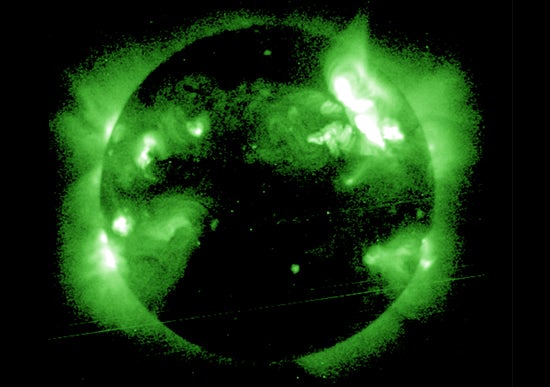“What would you do if the whole country went dark and you didn’t know if or when the power would be coming back?” National Geographic will explore this question on Sunday, October 27 at 9:00 p.m. Eastern Standard Time in “American Blackout.”
An “American Blackout” may occur due to a power grid failure created by a cyber attack or an electromagnetic pulse (EMP)—a high-intensity burst of electromagnetic energy generated by a solar flare or nuclear and radio-frequency weapons. An EMP would destroy critical electrical infrastructure and potentially shut down a large portion of the nation’s electrical grid.
A report commissioned by Congress states the U.S.’s dependence on the electrical power system renders it vulnerable to an EMP attack. A high-altitude (40–400 kilometer) nuclear detonation could produce a devastating EMP and create “the possibility of long-term, catastrophic consequences.” These consequences may include destruction of U.S. military operational capabilities, food and water supplies, communications, banking and finance, and transportation services.
The American Foreign Policy Council argues that Iran and North Korea are developing offensive EMP capabilities. North Korea has pursued “long-range nuclear-capable missile technologies” and a “‘Super-EMP’ nuclear warhead,” while Iran has “conducted missile launches off vessels in the Caspian Sea,” showing the nation “could cause devastating harm to the U.S. through a ship-launched EMP attack.”
Once launched, a long-range ballistic missile equipped with a nuclear warhead intended to cause an EMP can reach the United States in as little as 33 minutes. Having a comprehensive, multilayered ballistic missile defense system is one way to mitigate this EMP threat. Yet the current missile defense budget has been reduced by $500 million to $9.2 billion for fiscal year (FY) 2014—and this doesn’t include sequestration. Heritage has estimated $11 billion is needed to adequately fund the U.S. missile defense system.
To keep an “American Blackout” as part of science fiction and not reality, the U.S. must also harden and increase security at its critical infrastructure, create federal and state EMP emergency plans, and protect the homeland from a nuclear-based EMP strike by fielding a comprehensive missile defense system based on land and in space.
John Collick is currently a member of the Young Leaders Program at The Heritage Foundation. For more information on interning at Heritage, please click here.































